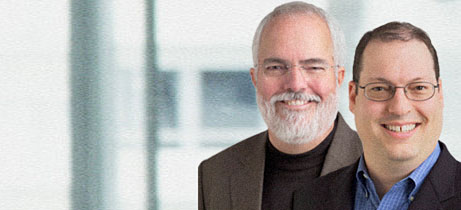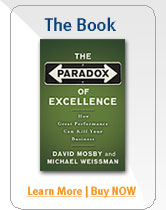We are often asked about this concept, The Paradox of Excellence and how it affects our business. Below is a brief discussion between co-authors Michael Weissman and David Mosby.
Michael Weissman (MW): What exactly is the Paradox of Excellence?
David Mosby (DM): The Paradox of Excellence is when your performance improves, that performance becomes less apparent – it becomes invisible to your customers. Instead of becoming more highly valued because your performance is improving, your perceived value erodes as customers take your great performance for granted. Then, when a small problem emerges, that problem becomes the only part of your performance that customers remember and they judge your performance only on the negatives – forgetting all the great performance you did before.
MW: How can the Paradox of Excellence kill a business?
DM: As performance becomes invisible, a company’s core value gets commoditized because customers don’t value that core as much. Customers expect more performance for less and aren’t satisfied – even if performance is excellent. This results in price pressures, declining customer loyalty and ultimately, customer attrition.
The Paradox of Excellence becomes deadly when companies believe the answer to the problem is to get on what we call the “new-feature treadmill”. To combat commoditization and attrition, companies invest heavily in new features to justify higher margins and recapture customer loyalty. Unfortunately, they are solving the wrong problem. Weak performance didn’t cause disloyalty, invisibility did. These investments increase margin pressure and have lower ROI because customers quickly take the new performance for granted and don’t fully value the improvements. Companies that stay on this course get to a place of very high costs and low customer loyalty.
MW: Is this concept only for big companies or can it apply to smaller firms?
DM: The Paradox of Excellence applies to everyone. It applies to governments, schools, non-profits, and companies of 1-2 people. We have worked with start-ups all the way to some of the largest firms in the world and have seen the Paradox of Excellence all over the place.
MW: Does this relate to individuals as well?
DM: Yes. We see the Paradox of Excellence at work between any two parties – between spouses, parents and children and bosses and subordinates. At any given moment, one is providing a service to another. I can’t tell you how often people come up to us after a conference and say that the Paradox of Excellence explained what happened in my marriage or in my career. Many people today feel undervalued and underappreciated – even when they do a great job.
MW: How can someone know they are suffering from the Paradox of Excellence?
DM: The symptoms are common and easy to see. If you are suffering from heavy price pressure or commoditization, if your performance is being taken for granted, if small issues become big issues and customers are switching from your brand for no apparent reason, you are likely suffering from the Paradox of Excellence. If customers always want more and don’t appreciate what you are already doing, you are suffering from the POE.
MW: Why does the Paradox of Excellence happen?
DM: We neglect to reinforce the value of what we deliver now – allowing our value to become invisible. In order to render an opinion about what we do, customers need some way to evaluate our performance. When we don’t give them the criteria, they use their own, unconstrained expectations as those criteria – even when those expectations are unrealistic. Once we are judged by a customer’s arbitrary set of expectations, we can become commoditized, devalued and at the mercy of our customer’s whims.
MW: What can we do about it?
DM: We need to get customers to see the value we already provide. We need to reinforce our distinguishing value in the minds of our customers. This can be through Value Reinforcement Marketing, Value Reinforcement Selling or even Value-Reinforcement Services. We need to do it continuously. Yet each situation is different and we need to be sensitive to the social rules at work in that situation. Therefore, to overcome the Paradox of Excellence, we need to continuously reinforce our distinguishing value in socially acceptable ways.
MW: How do we do that?
DM: Invest to understand. We need to know how the underlying customer expectations shape the assessments these customers use to value us.
Clarify our value. Most companies abandon their core value too early and focus on new, differentiated features. This undermines the core and accelerates commoditization. Companies need to identify and clarify their value.
Shape the conversation. By continuously reinforcing the company’s value in socially acceptable ways, companies can shape the market’s conversation and agenda – leading to better assessment by their customers.
Build repeatable behaviors. To sustain the benefits of these ideas over the long term, companies need to build the appropriate systems and practices. Otherwise, the benefits of these ideas, like many other great management concepts, will fade.
MW: Tie together the relationship between all of what we have just learned with how we become highly valued.
DM: We all want to be valued because being valued gets us higher margins, more employees and better support from our communities. We are only valued when our constituencies see, remember and appreciate what we do for them. Therefore, Value Reinforcement techniques are used to create the positive surprise and positive assessments needed to finally be fully valued.





